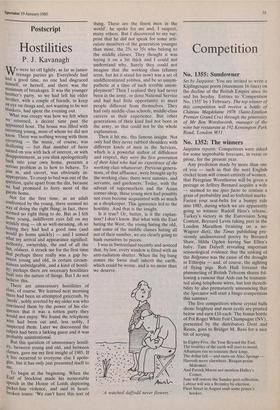Postscript
Hostilities
P. J. Kavanagh
We were let off lightly, as far as junior teenage parties go. Everybody had had a good time, no one had disgraced himself, or herself, and there was the minimum of breakages. It was the younger brother's party, so we had left his older brother, with a couple of friends, to keep an eye on things and, not wanting to be wet blankets, had spent the evening out. What was creepy was how we felt when we returned, a decent time past the appointed hour. The house was filled with cavorting young, most of whom we did not know. There was nothing wrong with them cavorting — the music, of course, was deafening — but that number of faces turned on you with lack of interest, or with disappointment, as you slink apologetically back into your own home, presents a serious problem as to how to behave. To Join in, and cavort, was obviously in- appropriate. To creep to bed was out of the question, quite apart from the din, because We had promised to ferry most of the guests home.
Not for the first time, as an adult confronted by the young, there seemed no Way of doing the right thing; in fact, there seemed no right thing to do. But as I felt those young, indifferent eyes fall on my wrinkly mug — oh so well-meaning, oh so hoping they had had a good time (and would go home quickly) — and I sensed What my arrival and appearance signified: authority, ownership, the end of all the fun, oldness, it struck me for the first time that perhaps there really was a gap be- tween young and old, in certain circum- stances unbridgeable, and a kind of hostil- ity; perhaps there are necessary hostilities built into the nature of things. But I do not believe this.
There are unnecessary hostilities of Class, of course. We learned next morning there had been an attempted gatecrash, by `Mods', nobly averted by my older son who Convinced them by the power of his elo- quence that it was a rotten party they Would not enjoy. We found the telephone wire had been cut and, less nobly, I suspected them. Later we discovered the culprit had been a larking guest and it was Probably unintentional. But this question of unnecessary hostil- ity, between young and old, and between classes, gave me my first insight of 1985. If it has occurred to everyone else I apolo- gise, but it has only just presented itself to me.
To begin at the beginning. When the Earl of Stockton made his memorable speech in the House of Lords deploring Picket-line violence, and said in heart- broken tones: 'We can't have this sort of thing. These are the finest men in the world', he spoke for me and, I suspect, many others. But I discovered to my sur- prise that he did not speak for some arti- culate members of the generation younger than mine, the 25s to 35s who belong to the middle classes. They thought it was laying it on a bit thick and I could not understand why. Surely they could not imagine that the working class (clumsy term, but let it stand for now) was a set of undifferentiated yobbos, and be so unsym- pathetic at a time of such terrible unem- ployment? Then I realised they had never been in the army, or done National Service and had had little opportunity to meet people different from themselves. They had only middle-class schools, middle-class careers as their experience. But other generations of their kind had not been in the army, so that could not be the whole explanation.
Then it hit me, this famous insight. Not only had they never rubbed shoulders with different kinds of men in the Services, which is a powerful author of diffidence and respect, they were the first generation of their kind who had no experience of the working class whatsoever. Previous genera- tions, of that affluence, were brought up by the working class; there were nannies, and servants, and gardeners. Today, with the advent of supermarkets and the Asian corner-shop, these young men had possibly not even become acquainted with so much as a shopkeeper. This ignorance led to the hostility. And that is the insight.
Is it true? Or, better, is it the explan- tion? I don't know. But what with the East hating the West, the young hating the old, and some of the middle classes hating all not of their number, we are clearly going to bash ourselves to pieces.
I was in Switzerland recently and noticed that, by law, every window is fitted with an anti-radiation shutter. When the big bang comes the Swiss shall inherit the earth, which could be worse, and is no more than we deserve.
`A watched daffodil never flowers.'










































 Previous page
Previous page